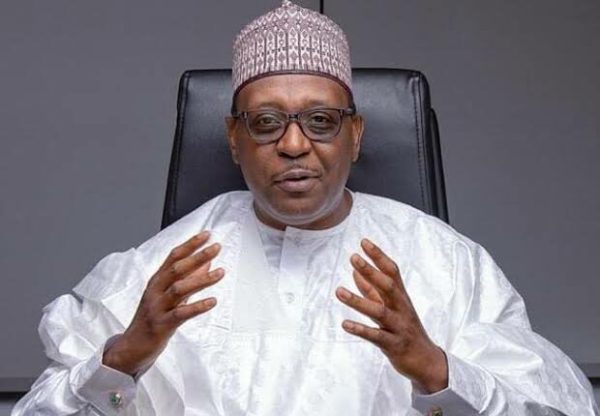The Coordinating Minister of Health and Social Welfare, Prof. Muhammad Pate, has stated that the new National Policy on Health Workforce Migration will help bring back Nigerian healthcare professionals, including doctors currently working in Diaspora.
His statement follows the Federal Government’s approval of the health policy, which aims to address the ongoing exodus of Nigerian doctors from the country.
In a post on his official handle on X on Monday, Pate reaffirmed the government’s commitment to tackling challenges related to healthcare human resources in Nigeria.
He mentioned that President Bola Tinubu approved the policy during a Federal Executive Council meeting at the Presidential Villa in Abuja.
“This policy is more than just a response to the ongoing exodus of healthcare professionals; it’s a comprehensive strategy to manage, harness, and reverse health worker migration,” the minister said.
“It envisions a thriving workforce that is well-supported, adequately rewarded, and optimally utilized to meet the healthcare needs of all Nigerians.”
The minister explained that by establishing streamlined registration processes and offering attractive incentives, the policy encourages the return of skilled professionals and reintegrates them into the Nigerian health system.
This approach leverages the expertise of the diaspora to address gaps within the health sector.
Additionally, the policy advocates for reciprocal agreements with other nations to ensure that the exchange of health workers benefits Nigeria.
These bilateral and multilateral agreements are designed to protect national interests while respecting the rights and aspirations of healthcare professionals.
The minister called on recipient countries to implement a 1:1 match—training one worker to replace every publicly trained Nigerian worker they receive.
Recognizing the importance of work-life balance, the policy includes provisions for routine health checks, mental well-being support, and reasonable working hours, especially for younger doctors.
These measures aim to create a supportive work environment, reducing burnout and enhancing job satisfaction.
Following Monday’s announcement, the minister reiterated on Tuesday that the policy signed by the president is a comprehensive strategy to manage, harness, and reverse health worker migration.
“The National Policy on Health Workforce Migration addresses the critical challenges facing Nigeria’s health human resources. As the AU Champion for Human Resources for Health and Community Health Delivery Partnership, Mr. President’s commitment to a resilient and robust healthcare system is powerfully reflected in this forward-looking policy,” Pate said.
The minister noted that many Nigerian healthcare workers have left the country due to inadequate equipment, worsening insecurity, poor working conditions, and low salaries.
Central to the policy is the Nigeria Human Health Resource Programme, which sets a framework for regular reviews of working conditions, ensuring that health workers, particularly in rural and underserved areas, receive the recognition and rewards they deserve.
67% Of Nigerian Doctors Practise In The UK
Pate also highlighted that Nigerian doctors and nurses are highly sought after globally, with 67% of them working in the United Kingdom (UK).
During an appearance on Channels Television’s Politics Today program on Tuesday, he stated that if Nigerian health workers were to withdraw from the National Health Service (NHS), the service would struggle.
He added that the policy is focused on health diplomacy and promoting ethical recruitment practices.
The minister emphasized that countries recruiting Nigerian professionals should also contribute to expanding training opportunities in Nigeria, as the migration of health workers is continuous and will not stop soon.
“Nigerians are vibrant, entrepreneurial, and capable wherever they are. If Nigerians were to hold back from the UK, for instance, the NHS would struggle to provide the services that many Nigerians go there to receive,” Pate added.
He revealed that over 75% of health workers trained in Nigeria last year have left the country for other nations as economic migrants, despite the quality of training provided in Nigeria’s universities and training centers.
Healthcare Journey Needs Collaboration, Innovation, Commitment
The Director of the Department of Health Planning, Research, and Statistics at the Federal Ministry of Health and Social Welfare, Dr. Chris Osa Isokpunwu, echoed the minister’s sentiments.
He stated that Nigeria’s healthcare journey should be characterized by collaboration, innovation, and a shared commitment to the health and prosperity of all Nigerians.
He added that the policy seeks to balance the aspirations of healthcare professionals with the needs of Nigeria’s healthcare system.
By implementing a holistic set of interventions, the policy aims to strengthen healthcare delivery, improve health outcomes, and secure the future of Nigeria’s healthcare workforce.
Magnitude, Trend Of Migration Among Nigerian Health Workers
Data from regulatory bodies indicate the magnitude and trend of migration among different cadres of health workers over the years:
- Medical Doctors and Dentists: The year 2022 marked a peak in the migration of medical doctors, with over 3,000 requesting letters of good standing from the Medical Dental Council of Nigeria (MDCN). The United Kingdom was the destination for 68% of these professionals.
- Nurses and Midwives: There was a significant increase in nurses requesting verification to migrate, with 52% choosing the UK and 36% the United States.
- Medical Laboratory Professionals: Between 2021 and 2022, 89% of the total migration of Medical Laboratory Professionals occurred through the Medical Laboratory Science Council of Nigeria (MLSCN).
- Pharmacists: In 2022, 72% of pharmacists who left Nigeria chose Canada as their destination.
- Optometrists and Physiotherapists: There has been a steady rise in the migration of optometrists and physiotherapists, with the UK being the primary destination.
The migration of healthcare workers exacerbates the shortage of professionals in Nigeria, leading to longer waiting times, reduced patient-to-provider ratios, limited access to specialized care, and decreased quality of services.
This also weakens the healthcare system’s ability to respond to public health challenges and perpetuates workforce shortages by reducing investment in health education and training.


